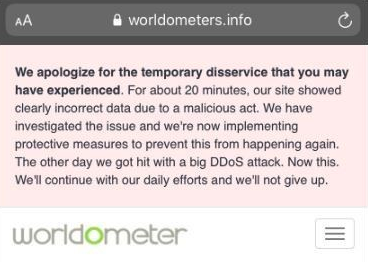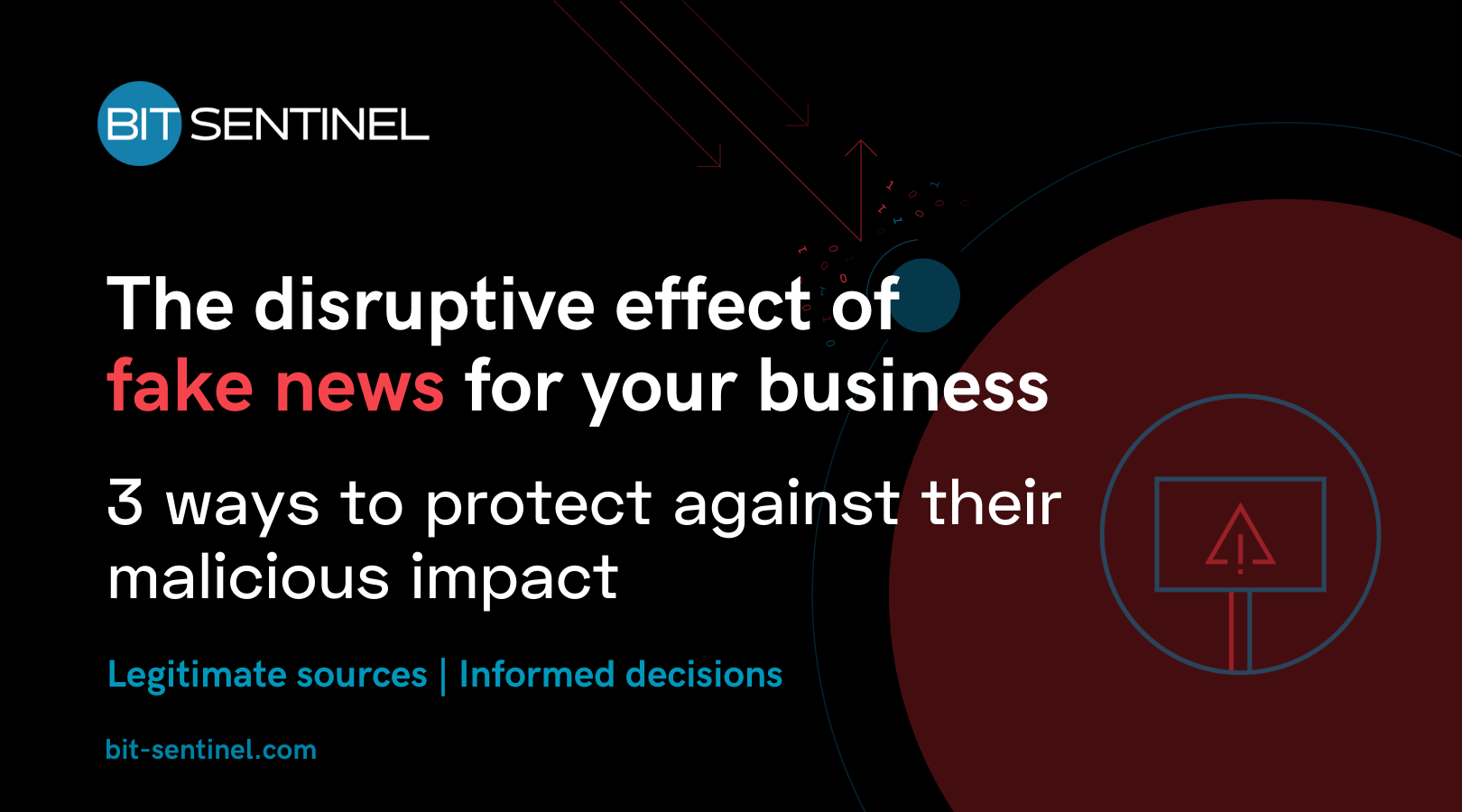What you can do about it?
For many companies, digital transformation used to be a plan for the future. If this is you, you’re not alone.
This forced reality caused a massive shift in priorities, with no time to plan for it or strategize.
Companies like yours need to go digital now, assembling the pieces of the puzzle as they go along.
What’s more, in the last month, we’ve seen countries close their borders, companies go remote, and people that struggle to figure out what’s really happening behind the flood of information coming from all channels.
To make matters worse, fake news and propaganda amplify the confusion and uncertainty, adding doubt and pressure to an already stressed and scared population.
Why does this matter to me and my business?
Fake news has the goal to create panic or to make a huge profit in these dark times. It’s enough to read the headlines on any social media platform to see thousands of messages that start with, “I heard that”, “ my friend told me that.” They might seem legit, but in fact they consist of information taken out of context and manipulated to create a new reality that serves malicious interest.
How fake news creates panic
In uncertain times, people need something to believe in. So they seek out information, often picking the ideas and data that aligns with their perspective and principles. This is called the confirmation bias and it often distorts our thinking even in normal, day to day life. In crisis situations, this tendency we all have can lead us to (re)act in ways that don’t serve our best interests.
What’s more, as humans, we are wired to trust spontaneous expressions on social media more than we trust experts in mainstream media. This slippery slope is what malicious actors ferociously exploit.
Fake news creates panic by:
- Making people believe they’re in danger, which causes emotional, irrational behavior (e.g. taking out cash from ATMs, emptying them)
- Instigating groups of people against each other by provoking feelings of racism, xenophobia, enforcing negative stereotypes, and can even lead to violence and murder
- Manipulating people into questioning the authorities and developing conspiracy theories that create more fear and uncertainty
- Tricking people into believing they have access to secret, behind the scenes information from insiders, and many more.
The recent example from the US, as reported by Financial Times, highlights two key aspects about fake news:
- The fact that it circulates via “largely via private, encrypted messages rather than open and closely-policed platforms such as Facebook and Twitter.”
- And the fact that it spreads like wildfire, at never before seen speeds.
Even the most rational people can fall for fake news which is why it’s essential we learn how to identify, block it, and report it.
As a business owner or key decision-maker, it’s especially important to be aware of fake news. In this delicate situation, you might end up making choices that severely impact your organization in a negative way. We’re here to help you avoid that critical pitfall.
How fake news makes a profit (disrupting businesses like yours)
In the past years, several key investigations have exposed the massive extent of fake news operations and the equally gigantic money behind them. A recent Cnet article paints a vivid picture:
“During the 2016 US presidential election, a Macedonian village turned false news into a cottage industry, using Facebook and Google to generate ad dollars. The Internet Research Agency, a Kremlin-linked troll farm, used Twitter and Facebook to post divisive messages that ran along America’s racial fault lines. Just last week, Facebook and Twitter removed more than 200 accounts linked to Russia that operated out of Ghana and Nigeria.”
Fake news can impact financial markets, causing stocks to drop.
“Metro Bank in the UK was forced to take to Twitter in May to reassure customers of its financial health after its share price dropped 11 per cent due to false rumours circulating on WhatsApp and Twitter, warning that the bank was close to collapse and encouraging customers to empty their accounts.”
They can – and have – influenced elections in countries around the world.
Fake news operations make money by pushing specific agendas, by influencing politics, commercial deals, and anything in between. They’re funded by malicious actors that are rarely in the spotlight.
They’re well-funded and have motivated actors behind them that will do anything to get what they want, whether that’s power, money, or a mix of the two.
How can they continue to do this in a crisis like this?
Don’t expect cybercriminals and scammers to have morals or limits. They don’t operate according to the same rules or principles – if they would, they wouldn’t be involved in cybercrime and making money from other people’s misery.
That’s why we discourage ransomware victims from paying to get their data back. There is no thiefs’ honor. Don’t trust the movies or preconceived notions. Be proactive, act to protect your employees, your business, your community and rely on what you can control, which is never other people’s actions – especially cybercriminals’.
COVID-19 fake news is dangerous for your business too
It’s clear that the COVID-19 pandemic is doubled by sweeping misinformation – an “infodemic” if you will.
The issue is so bad that, in Romania, the government started acting early on and continues to pursue and shut down online fake news outlets. According to Romania Insider, the authorities took down a website and the associated Facebook account for “publishing false, groundless information regarding the closing of some supermarkets and a ‘secret’ Government plan to bring Romanians from abroad back to the country.”
In the UK, a fake open letter sharing Bill Gates’ thoughts on the coronavirus pandemic has been widely shared online. It gained a lot of traction as it was soon shared by celebrities like Naomi Campbell or The Sun. No one knows where the fake open letter originated but it clearly shows how easy it is to kindle conspiracy theories, rage, and other negative reactions in a time when most people are in survival mode.
Fake news can also appear by selling fake medicine, by falsely advertising medical supplies, and miracle solutions to complex problems. This is a real and important danger during these times and your savings, budget, and other resources are valuable, so make sure you do everything you can to keep away from scammers and other malicious attempts.
What you can do to protect your business and community from fake news
Countries and organizations across industries are fighting an unseen war, with a force that cannot be stopped unless we all get involved and follow protection measures recommended by the authorities.
Italy has been roughly struck down with this pandemic and obviously, the fake news crisis did not help. Lots of information was taken out of the context to create fear and the most well-known is about the military on the streets picture. We saw it on social media and everyone started to comment that a war is coming, sowing more panic. The real fact was that the military was returning from a practice session they had in Sardinia, completely unrelated to the COVID-19 crisis.
Yes, we’re living strange times that we never imagined would exist some time ago.
Is not easy to experience all of these things at once. Some companies will try to take advantage of this crisis and sell dreams and snake oil and others will adapt and update their vision, rooting even deeper in their core beliefs. Whatever happens, stick to your values, keep an eye on legitimate specialists and information sources, and give a helping hand if you can. This kind of crisis seems easier when you have reliable partners to work with and a team to get along and support your choices.
How to identify trustful publications and real information
1. If you read or hear something that seems exaggerated, unreal or too good to be true, double check the source and ask officials to confirm. In some cases, this might not be enough, as even fake news seems to be easily believed in such dark times. The best you can do is don’t share such information in social media and become a pawn in this gameplay.
2. Read and follow ONLY official information. In this digital world, it’s hard to recognize official information as there are so many malicious actors with the tools ready to make some profit out of any crisis. Make sure you are careful where you buy things from. The crooks willing to make profit have their deposit packed with everything you might need. Surely you’ve heard of the brothers Matt and Noah Colvin who bought over 17,000 bottles of hand sanitizer, expecting to make a profit while vulnerable people went without basic necessities in critical times. Buy from legitimate sources and use your money and influence to support those who do good.
3. Follow the trail of the information. Sometimes, fake news tends to spread faster than legitimate information and it’s often because of the headlines. Even if you read a scary headline in the media (which is mainly used as clickbait), try to follow the trail of the information. If it is something related to a specific country or city, see if you know someone who lives there and ask for details or double check with other media and other sources.
It’s very important to stop the spread of fake news, to educate our parents and grandparents to avoid clicking or sharing headlines that seem strange or unbelievable (because they almost always are!) and stop believing everything they hear. Remember that older people are the most common victims of crooks in their phishing attacks and scams.
We know and encourage you to actively follow the subject of the COVID-19 but make sure you follow only credible sources to see the evolution and be prepared for what will follow.
Moreover, we saw that even important sources of information have been targeted by attackers – https://www.worldometers.info had a downtime as it was hit by cybercriminals with DDoS attacks some time ago. According to Bloomberg, the US Health and Human Services Department also suffered a cyber attack.

All in all, in these difficult times remember to keep an open eye to potential phishing attacks and scams as well as to fake news. Make sure you read information from legitimate sources and always double check the information before sharing it on social media.
We can get through this if we stick together and we follow the instructions given by authorities and specialists.
Legitimate information sources to follow:


